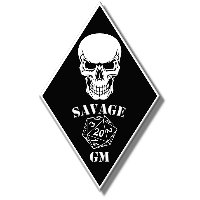Proelium Ex Deus said: One final thought.... I will tinker with your code, Scott, but could you (or someone) help me solve the inline min. value that GG suggested earlier. I've tried using every combination I can think of, (inc. those suggested on <a href="https://wiki.roll20.net/Dice_Reference" rel="nofollow">https://wiki.roll20.net/Dice_Reference</a> ), without success... unless this is something that MUST be done via worksheet. Specifically, my inline code looks like this: [[@{add_damage}-@{tgt_def}]] I've tried every combination I can think of (inc. crazy ones, lol) to make the result no lower than 0, when tested... all without success. e.g. [[{round(@{add_damage}-@{tgt_def}),0d0}kh1]]
[[{floor(@{add_damage}-@{tgt_def}),0d0}kh1]]
[[{@{add_damage}-@{tgt_def},0d0}kh1]]
[[@{add_damage}-@{tgt_def}kh1]]
[[@{add_damage}-@{tgt_def}|0]] etc.... Would this suggest that achieving an inline min. of 0 not possible without using a sheetworker? (edit, as Kraynic pointed out, I screwed up the brackets while typing what I'd tried. It's fixed now) so, this is partially going to depend on what the possible values of add_damage and tgt_def are. You can't mix rolls and raw numbers in grouped rolls (the {...,...} part of the syntax. So, if add_damage and tgt_def are always going to be raw numbers (e.g. 2, 3, 4, floor(5/2)), then you can't use 0d0 in the second argument. Since I think this is what they are, here's what it should look like: [[{round(@{add_damage}-@{tgt_def}),0}kh1]] I've left the round calcing on the add_damage - the tgt_def because not sure if that was intended, but unless there's some division/multiplication in those two attributes, you don't need the round(). Here's the code that I used to test this: [[{floor(5/2)-?{what|1|5},0}kh1]]


















